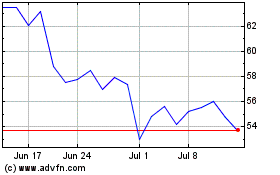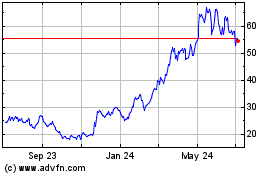Argentine Banks Stumble in Adoption of New Accounting Standard
June 24 2019 - 5:59AM
Dow Jones News
By Maria Armental
New accounting requirements aimed at establishing a common set
of standards around the world hit Argentine banks in the middle of
a recession and runaway inflation.
Four Argentine financial firms missed filing deadlines for their
annual reports during the second quarter and were deemed delinquent
by the U.S. Securities and Exchange Commission. The companies,
which are required to make U.S. regulatory filings because they
issue American depositary receipts, blamed the adoption of the
International Financial Reporting Standards for the filing
delay.
The firms are Grupo Financiero Galicia SA, whose largest holding
is Banco de Galicia; Banco Macro SA; BBVA Banco Francés SA, the
Argentine unit of Spain's Banco Bilbao Vizcaya Argentaria SA; and
Grupo Supervielle SA, which owns Banco Supervielle.
At issue was a switch to IFRS accounting standards during
skyrocketing inflation in Argentina. IFRS rules require companies
to monitor inflation and implement special procedures for reporting
in the currency of a hyperinflationary economy when the three-year
cumulative inflation rate exceeds 100% for several months.
Argentina's economy has been considered hyperinflationary for
accounting purposes since July 1, 2018, a determination that
required the companies to account for that inflation.
Companies had to change their accounting and reporting practices
and train staff to process adjustments for inflation in addition to
restating comparative figures in financial reports to reflect the
loss of purchasing power of the Argentine peso. All four firms have
since filed the required reports.
The application of hyperinflation accounting under IFRS drove
Grupo Galicia to a loss of 3.83 billion pesos in 2018 ($89.5
million at the current exchange rate), from a year-earlier profit
of 7.28 billion pesos, according to its SEC filing.
Similarly, the BBVA Argentine unit swung to a loss of 1.57
billion pesos in 2018, compared with a profit of 1.86 billion pesos
in 2017, it said in a filing.
Separately, BBVA disclosed this month that Argentine authorities
are investigating it for alleged violations of
anti-money-laundering and terrorist financing regulations. A
representative for BBVA had no immediate comment for this
article.
Grupo Supervielle reported a loss of 3.06 billion pesos in 2018,
compared with a restated loss of 755.3 million pesos in 2017,
according to its filing. Under the old accounting standards, it had
reported a 2017 profit of 2.44 billion pesos. A representative for
Grupo Supervielle said the firm opted to deploy the new standards
in full, in line with the Argentine Central Bank's planned
adoption.
Meanwhile, Banco Macro reported a net loss of 734.1 million
pesos in 2018 under IFRS, compared with a profit of 6.02 billion
pesos in 2017.
Representatives for Banco Macro, Grupo Galicia and the SEC
didn't respond to requests for comment.
Write to Maria Armental at maria.armental@wsj.com
(END) Dow Jones Newswires
June 24, 2019 05:44 ET (09:44 GMT)
Copyright (c) 2019 Dow Jones & Company, Inc.
Banco Macro (NYSE:BMA)
Historical Stock Chart
From Mar 2024 to Apr 2024

Banco Macro (NYSE:BMA)
Historical Stock Chart
From Apr 2023 to Apr 2024
